Throngs Brave the Cold to Stand up for Democracy
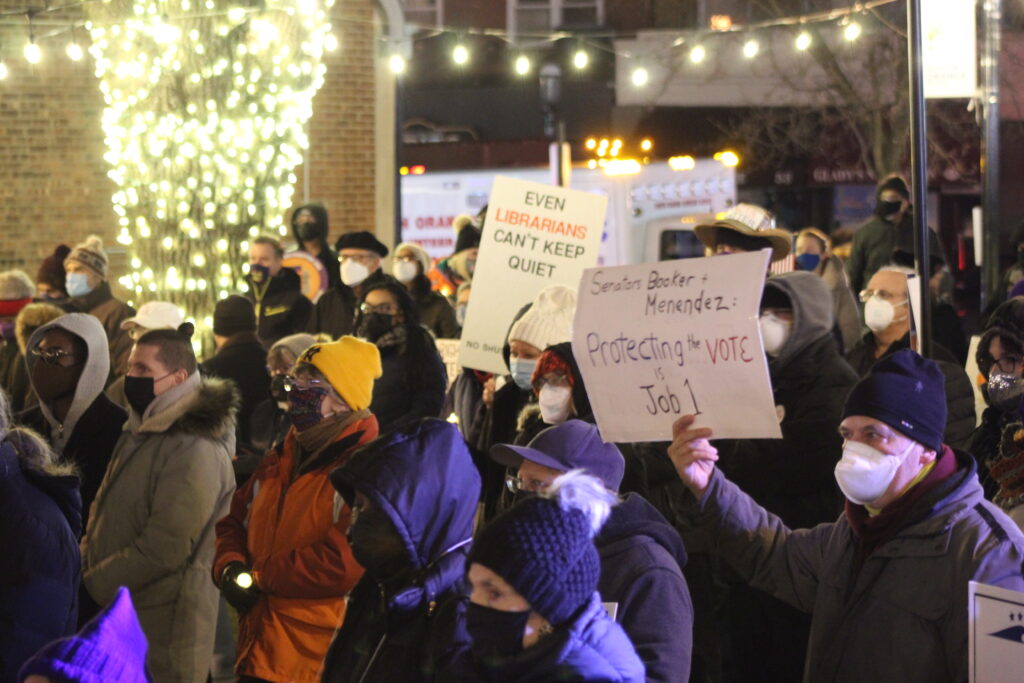
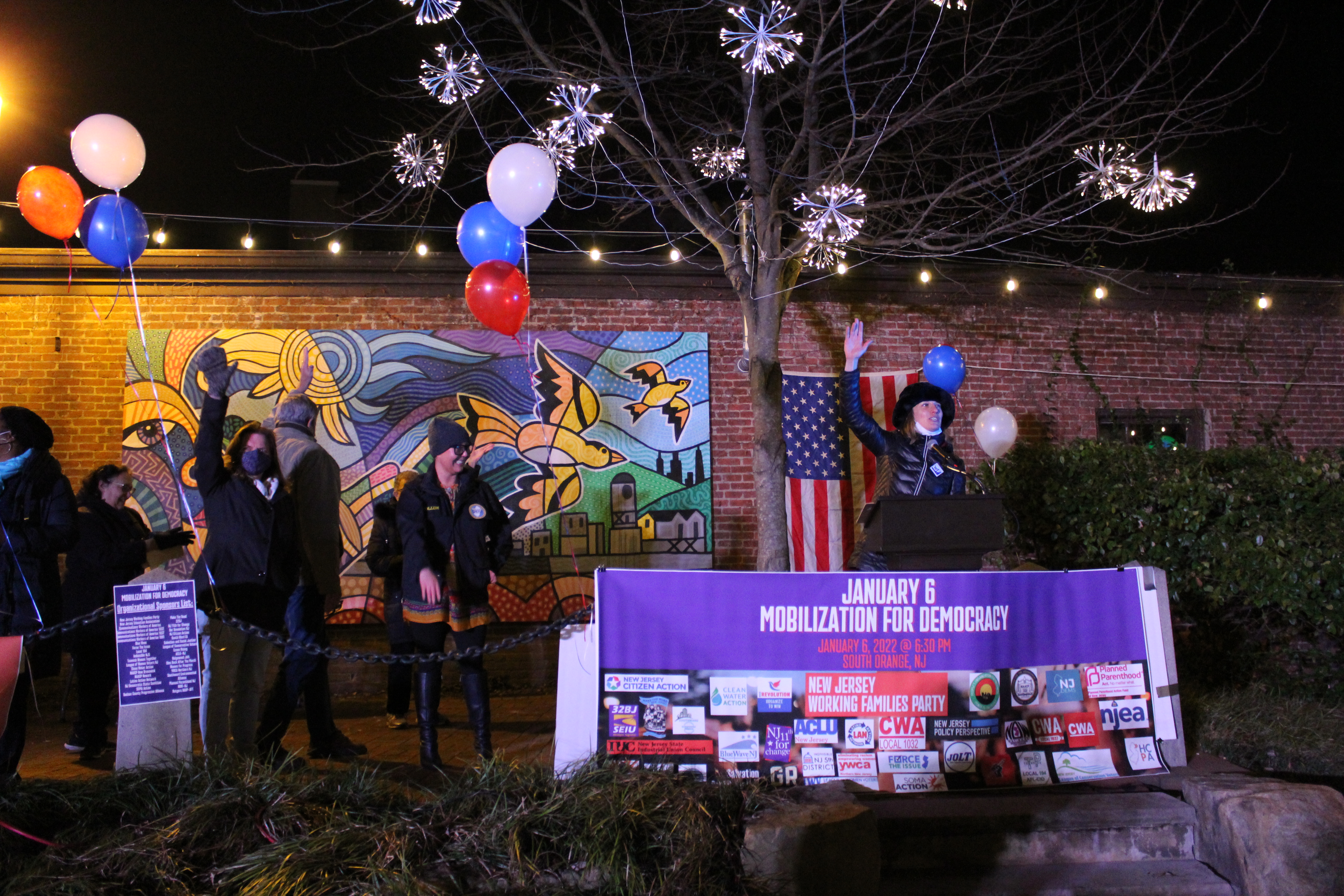
For over an hour in freezing temperatures, Spiotta Park in South Orange was filled with supporters, advocates, and speakers called to the January 6 Rally for Democracy hosted by New Jersey Working Families and supported by some 38 other New Jersey based progressive advocacy groups, unions, and allies such as the People’s Organization for Progress. The overall message was clear: if democracy is to survive in the United States, organization and unity must prevail.
Sue Altman of NJ Working Families served as the event’s emcee, which brought speaker after speaker to address the audience, many of whom carried signs both homemade and professionally printed. Battery-powered candles were being handed out, clutched in the gloved or half-frozen fingers of the faithful, while literature was passed to the participants. SOMA Action flyers urged people to contact Senators Booker and Menendez to “do whatever is necessary to end the filibuster” and advance the Freedom to Vote Act, the John Lewis Voting Rights Act, and the Protecting Our Democracy Act.
South Orange Village President Sheena C. Collum was brought up by Altman to speak first. Collum’s speech was a slight departure from the purely political and ideological addresses given by the other speakers. She urged everyone to get their vaccinations and booster shots as a necessary component of their work to stem the tide of authoritarianism in the United States. “Tonight we’re mobilizing for democracy, but in order to protect democracy, we need to protect ourselves and each other and what I’m talking about is the vaccination and the booster,” Collum said. “When we came together here in Spiotta Park in November to get out the vote for Phil Murphy, in line A, we talked about how we had 90% vaccination rates in South Orange and Maplewood. Yet, unfortunately, since that time, we have not been immune to the increase in COVID-19 positive cases and specifically the Omicron variant in the past month.”
As Collum spoke to the masked-up crowd, she said that South Orange and Maplewood had seen “devastating” increases in virus cases in the last month. “If we want to fight for democracy, if we want to fight for voting rights, if we want to be able to fight what’s going to happen in the midterm elections, we need to be healthy, we need to be healthy for ourselves and for each other. We need to be able to go door to door, our kids need to be in school and educated so that they can fight for democracy when it’s their turn to step up and start bringing people in and fighting the good fight.”
A benediction was delivered by Rabbi Robert Tobin of B’nai Shalom in West Orange. The rabbi called for a moment of silent prayer and meditation, reflecting on the Capitol Hill insurrection one year prior. “We recall the arrogance and violence of those who would put themselves above the power of the people, placing self above all. That attack was the cause of great harm, death, and trauma, for the dead and for the suffering… As a people, our diverse beliefs, our many faiths, our spiritual strength, and our civic pride bring us back to the ballot box to choose leaders to hold our sacred trust. They are dutifully sworn to place duty over ambition, country over self, and to uphold the laws and constitution of the United States of America. We pray each in our own way, and name that those leaders forever be taught the insights of faith and humility, and to be endowed only with a servant’s heart.”
Altman then introduced Hetty Rosenstein, a figure familiar to New Jerseyans both as the New Jersey director of the Communication Workers of America and as Governor Phil Murphy’s Senior Advisor for Progressive Coalitions and Outreach. Rosenstein delivered a fiery address, touching on a theme which was common throughout most of the speakers—that of organizing and unifying the fractured progressivist movement as a check on the erosion of voting, labor, and reproductive rights. Rosenstein blasted the MAGA movement as one which was violent and posing an imminent threat to American democracy, made manifest most plainly by the insurrection a year earlier. “Today is the anniversary of an effort to take down our elected government and install an unelected dictator,” Rosenstein said, referring to former President Trump.
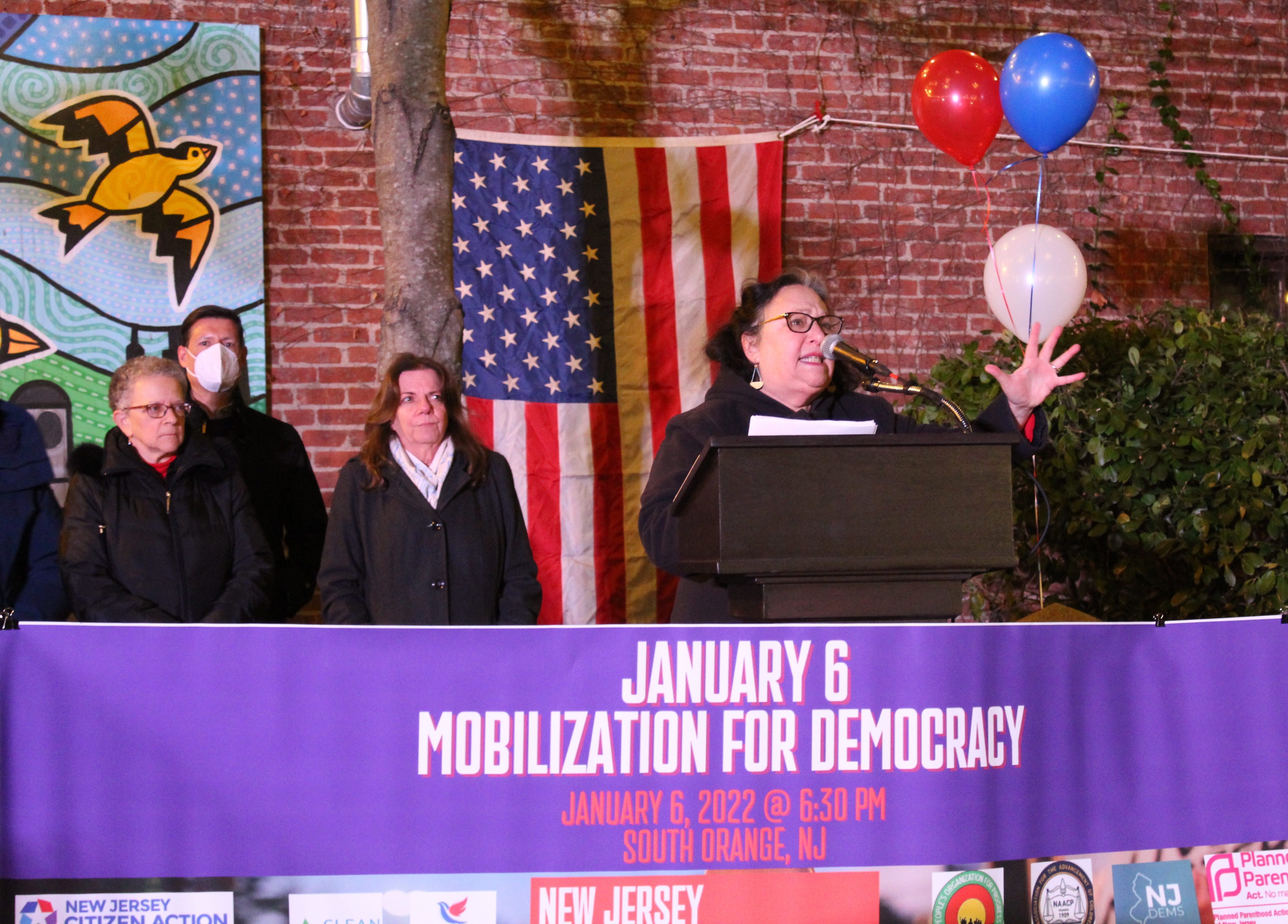
Rosenstein, like the speakers who would follow, emphasized that the conditions and mindset which led to the riot have not dissipated and the threat remains. “American democracy is hanging by a thread. The January Sixth Insurrection did not take place in a vacuum. It has been part of a 30-year march to authoritarianism which began with eliminating union rights and democracy at the workplace, destroying the Fairness Act and regulation, and embracing lying, craziness, and violence. Donald Trump is not the cause: he is the culmination of people who will trample and beat members of the Capitol Police and walk through the halls of Congress calling for Nancy [Pelosi] or ‘Hang Mike Pence’.”
Rosenstein’s impassioned speech warned that the judiciary was on the side of the MAGA movement. “The Supreme Court will soon not only overturn Roe v. Wade, but will decide whether or not the Second Amendment protects the right to carry any weapon in any place at any time. The MAGA movement is not only a racist and white supremacist movement, it is a violent movement. They are armed and they were almost successful in preventing the peaceful transfer of power. They will do anything. I have to ask, what about us? What are we willing to do to protect democracy?”
Rosenstein described the MAGA movement as one which had internal differences but was still nevertheless unified. She lamented and railed against the petty factionalism which has handicapped the Left in New Jersey. For Rosenstein, this factionalism would prevent them from opposing what she categorized as a more unified Right whose adherents were more likely to stand together so long as they followed Trump. “We reject working with each other over minor things—we can’t keep doing that! We must build a Protect Democracy movement that’s moderate to progressive, and includes the independent third parties, and even non-Trump Republicans. The MAGAs are not the majority. They didn’t win, but they are individually committed. And what are we? Sometimes we are begging, please knock on doors, please make a phone call, please come out. They are willing to go through windows and trample the Capitol Police! We must be a movement, we must be courageous and self sacrificing or we will lose. We will lose voting rights, reproductive rights, equality and to safely protest. We cannot afford to fail.”
To achieve these ends, Rosenstein said that the organizations would be rolling out a host of training programs, Zoom sessions, outreach, direct democracy initiatives, demonstrations, lobbying, and most importantly, a “massive coordinated voter registration and turnout plan.” These would be the operations needed to produce a more cohesive, on-the-ground grassroots effort to educate and defend the democratic process from the MAGA movement, according to Rosenstein.
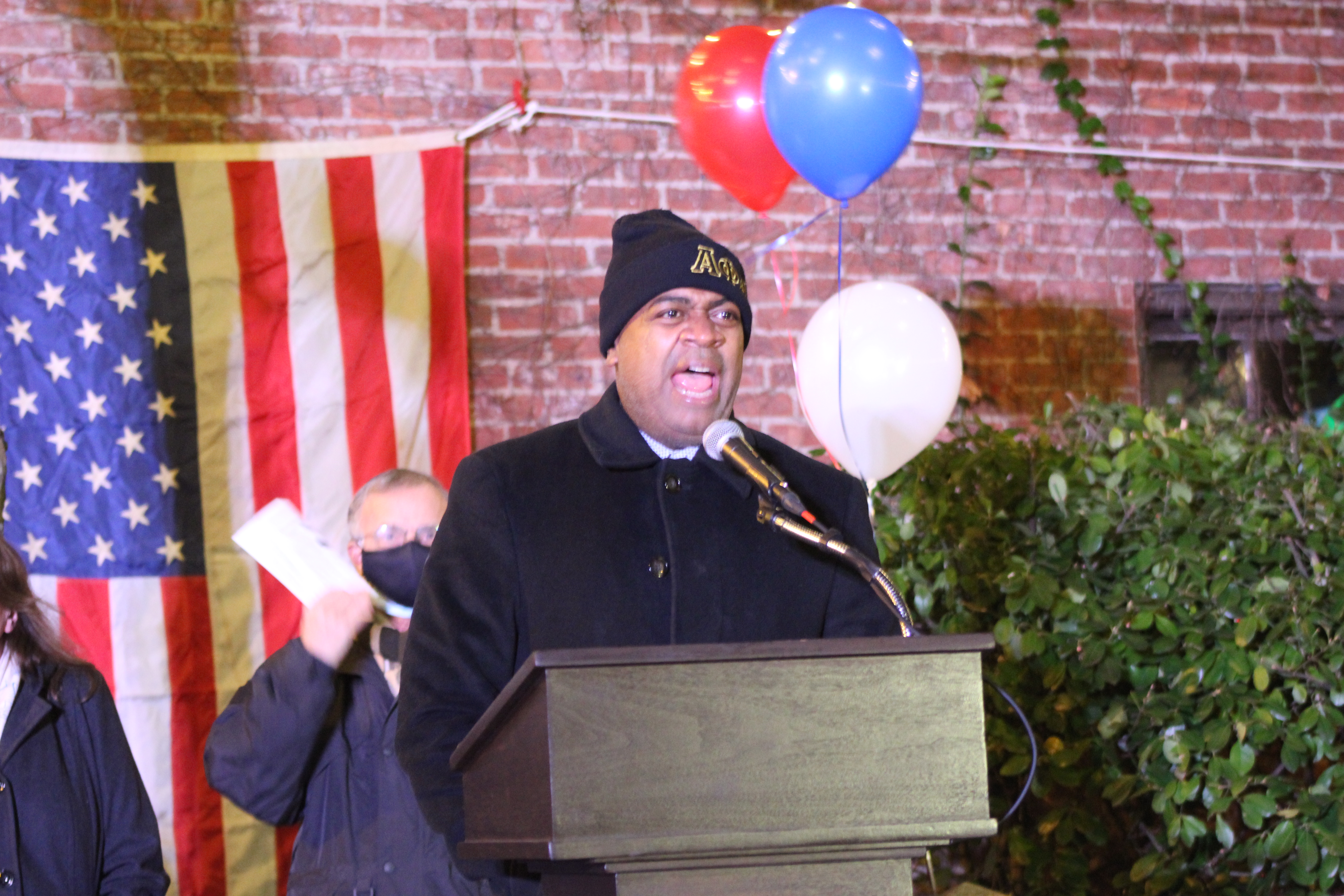
Newark Mayor Ras Baraka spoke, calling January 6 Eugene Goodman Day, in recognition of the African-American Capitol Hill police officer whose efforts saved the lives of many federal lawmakers inside the Capitol Building. Baraka hailed Goodman’s efforts, defending a democracy which did not fulfill its promises to African-Americans’ past. “These people who invaded the capitol that day, a lot of us like to give credit to Donald Trump. Donald Trump is just a figurehead. He’s a distraction. In fact, while we were focused on Donald Trump, they were stealing our voting rights. When we were focused on Donald Trump, they were peeling back LGBTQ rights… they were revising history in school and so they got to a point where they were big enough and proud enough to say, ‘we don’t even want to teach it at all’. We were focused on Donald Trump, they were making sure we didn’t tax the millionaires, they were giving breaks to the big companies, the pharmaceutical industry. While we were focused on Donald Trump, they put together a plan to invade the Capitol and the world watched democracy in peril on January the sixth.”
Baraka said that calling for democracy to be protected was more than simply voting. “Why are we still fighting, even today, for the very things we are supposed to have anyway? We support democracy, but what the heck is democracy? Some of us believe in our ability to go pull a lever, push a button, write our name on a piece of paper. Democracy is our ability to shelter the vulnerable, to give voice to people who don’t have a voice at all, to be able to feed people who go without food. Democracy is our ability to include all of us, our race, our language, our religion, what we believe, who we love, where we originate, and how well or bad our actions are. To ensure that we have access to quality education, no matter our zip code, that we’re able to get a decent education, no matter where we live, or who our mothers and fathers are. That is what democracy is about!”
Calling for a united front, Baraka went on to explain what he felt a “united front” actually represented, and warned the audience not to forget their allies, because when those divisions become apparent, their opponents grow stronger.
“We might have ten items and just because we disagree on number five, seven, and eight doesn’t mean we’re disagreeable,” Baraka said. “Sometimes we forget who our allies are so, every once in a while, New Jersey becomes a very red state. We don’t know how to struggle with one another but unify at the same time. We struggle in order to unify, we don’t struggle in order to divide, we argue with each other so we become more united, so we become clearer on the issues that we’re talking about, so that our philosophy is sharper. When we fight and we struggle our weapons are much more effective when we’re out here with one another. We need each other. As stated, they [the rioters] know they need each other, that’s why they united to run into the Capitol and we watched in horror on TV. I got two or three calls that day, people thought it was a joke, that what they saw wasn’t happening, that it was impossible, this could not be going on in the United States. They thought it was another country in some remote part of the world. But no, it was in Washington, DC, just a few hours away. The sad thing is, it could happen again.”
Baraka warned that the situation could get worse. Like Rosenstein, he emphasized the essential need for unification, and that to protect democracy, the ability to learn from disagreements without losing cohesion was critical. “Generals in the United States military say they need to run drills, to make sure that when this happens that we can deal with it, because there’s a possibility that maybe even the military may get involved. We need to be united in any differences we have, any problems that we have, we have to be sophisticated enough to argue with each other about it and then unite around it in the end. If you believe in democracy, and I believe in democracy, then we ought to be together.”
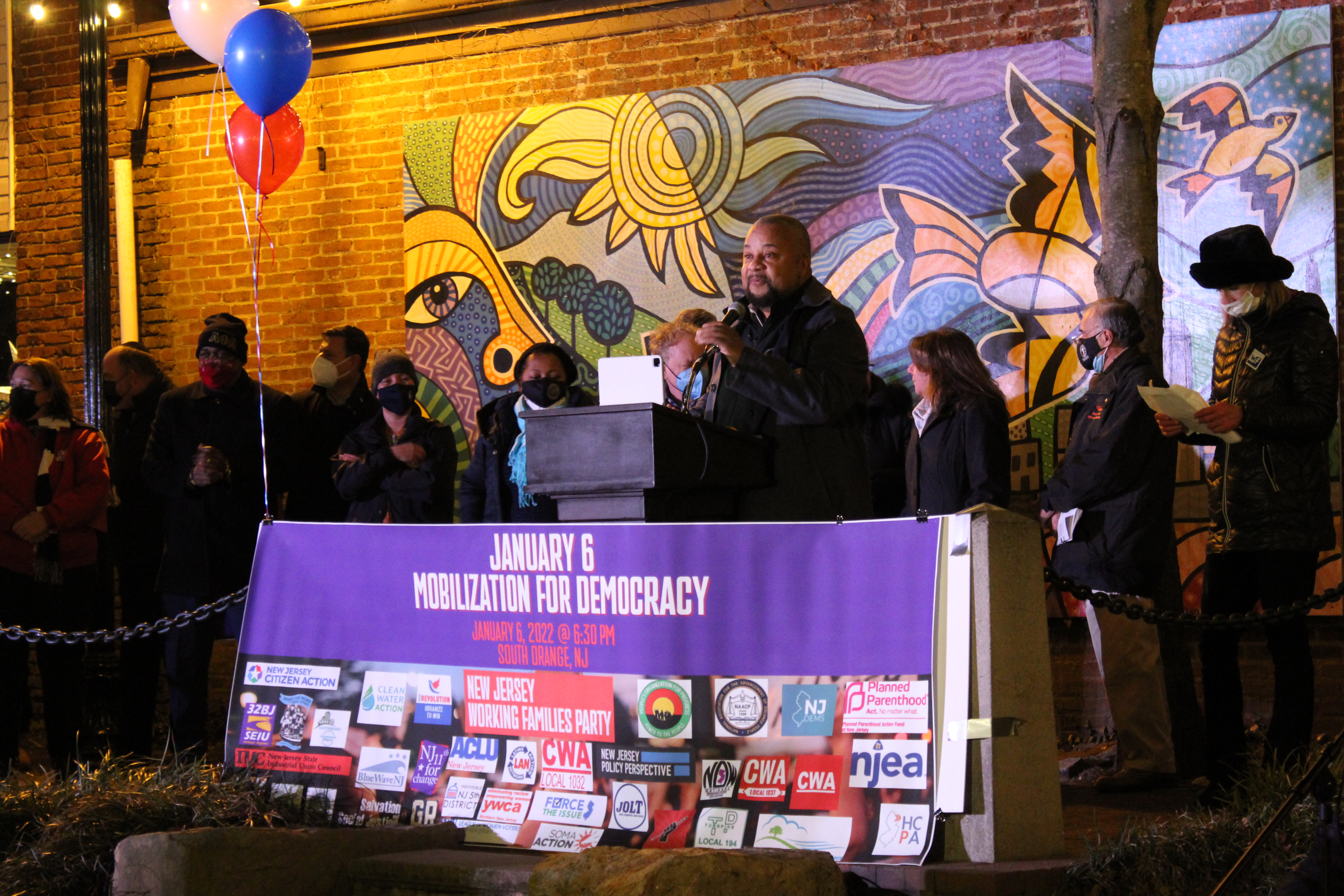
When Representative Donald Payne came up to the podium to speak, he said that South Orange, which he represented up until redistricting, would be in good hands with Representative Mikie Sherrill who would succeed him. Payne also addressed legislation being proposed—and passed—in other states to suppress the vote and undermine the democratic process. “We thought the right to vote was sacred and cherished by all Americans. We took pride in our ability to vote, accept the winner, and move on. We never thought any of those beliefs would be threatened. Ladies and gentlemen, we were wrong. The events of last year proved that our democracy needs to be protected before we lose it forever. We are at a precipice in this country’s history. Which way are we going to go? At least 19 states have passed 33 laws to make it harder for certain Americans to vote. There are hundreds of additional bills working through state legislatures right now to restrict voting even more. This must stop for our democracy to continue. In the US House of Representatives, I have supported several bills to protect our elections. I helped pass the John Lewis Voting Rights Advancement Act which prevents states with a history of voter discrimination from changing voting laws without permission from the federal government.”
Payne continued, explaining that he helped advance the For The People Act, which would, among other things, end political gerrymandering, and increase voting rights. “We need the Senate to pass these bills, and others like them, to guarantee the right to vote for future Americans. Yet, the news about voting is not all bad. Other states are realizing our democracy is in jeopardy. At least 25 states have enacted more than 60 laws to expand voter access and make it easier to vote in America. That is why these events are so important,” Payne said.
“They bring awareness and attention to the problems with our democracy,” he continued. “They encourage voters to fight for the sacred right to vote. They show state legislators that they need to protect the right with their bills and assets. If we do not, we could be a country where the will of the voters will be denied and that would be the end of American democracy as we know it. The events of January 6, 2021, showed us that we must act to protect democracy and the votes of all Americans. But if we learn the lessons of that day, and take those actions, we may be able to avoid greater threats to our democracy in the future.”
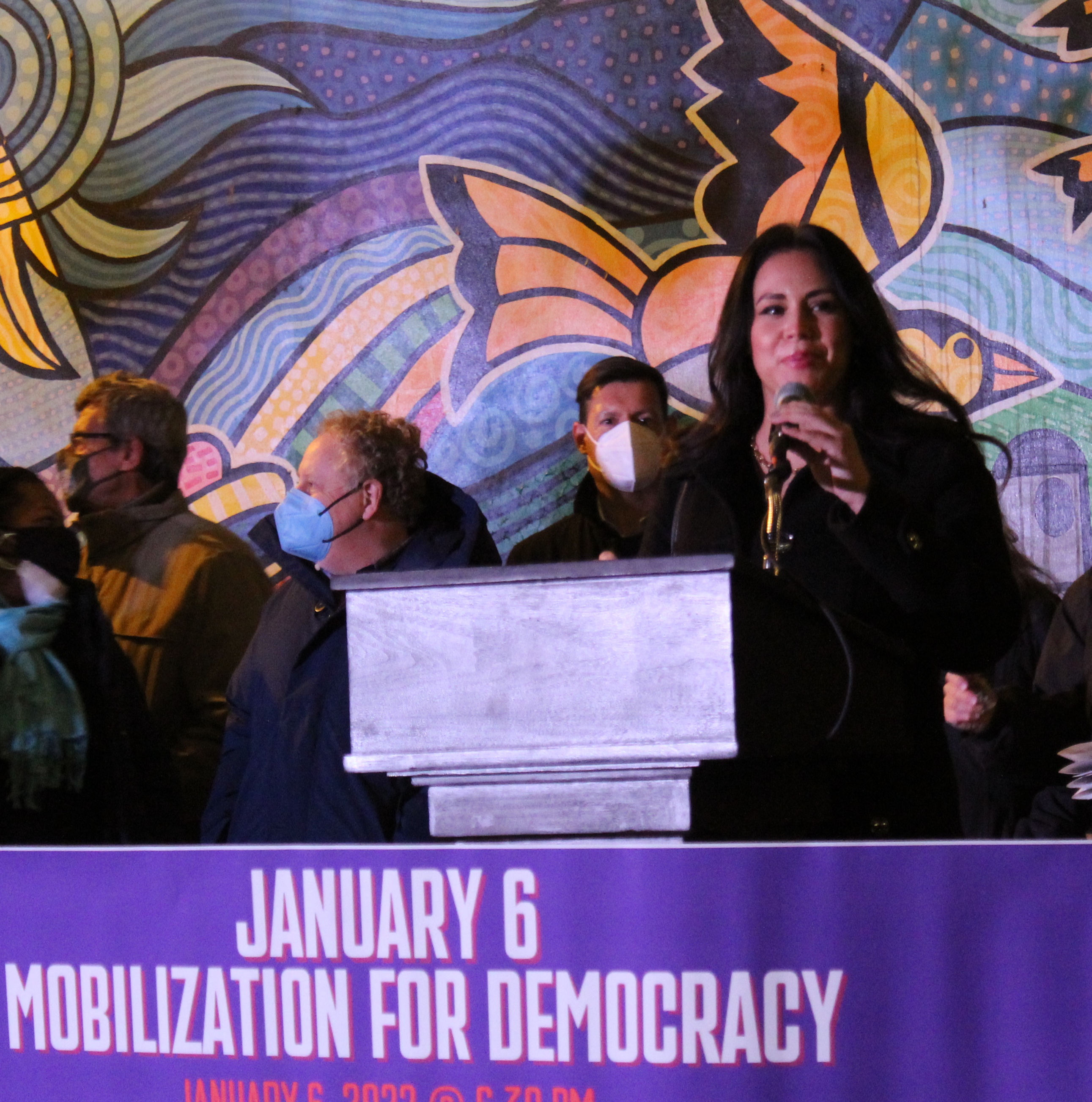
To bridge the political aisle, Altman introduced former assemblywoman Maria Rodriguez-Gregg, who represented LD 8 from 2014-2019. The Evesham Republican was the first Hispanic woman elected to the New Jersey Assembly and also refused to endorse Donald Trump.
“She and I probably don’t agree on a lot of issues,” Altman said, “but I’m actually choking up thinking about being a woman, being a woman of color, representing her community, and never endorsing Trump.” Altman said Rodriguez-Gregg even endured death threats for her stance against Trump and praised her for her courage in standing firm.
“I’m a bit of the odd person out here,” Rodriguez-Gregg said, “to say that we must confront the threat to our democracy. In order to do that we need leaders in my party, the Republican Party, to demand accountability, confront the lies that mobilized the mob to attack our values and institutions of democracy on January 6. I’m here to ask Republican leaders to stand united and say that the election was not stolen. Instead of saying ‘stop the steal’, stop the lies and, importantly, [ensure] that the voices of voters will not be suppressed. It is time to demand accountability for those that led to that insurrection on January 6. I’m also here to say that we don’t always agree on policy, we may sometimes disagree on courses of action, but I still stand here united with everyone, regardless of politics, party affiliation, to show that we can rise above partisanship. As an elected leader, I was elected to represent the people, not my party.”
Rodriguez-Gregg paraphrased the early civil rights leader, Bayard Rustin, who said, “If we desire a society that is democratic, then democracy must become a means as well as an end.”
Altman, a champion of the New Jersey left, applauded Rodriguez-Gregg and expressed her respect for the former lawmaker. “If the Republican Party was like Maria, we would be in pretty good shape, right? I want to get to a point where we can have a debate about policy, and about the direction of this country that does not negotiate on the fundamental premise that every human being has the right to vote.”
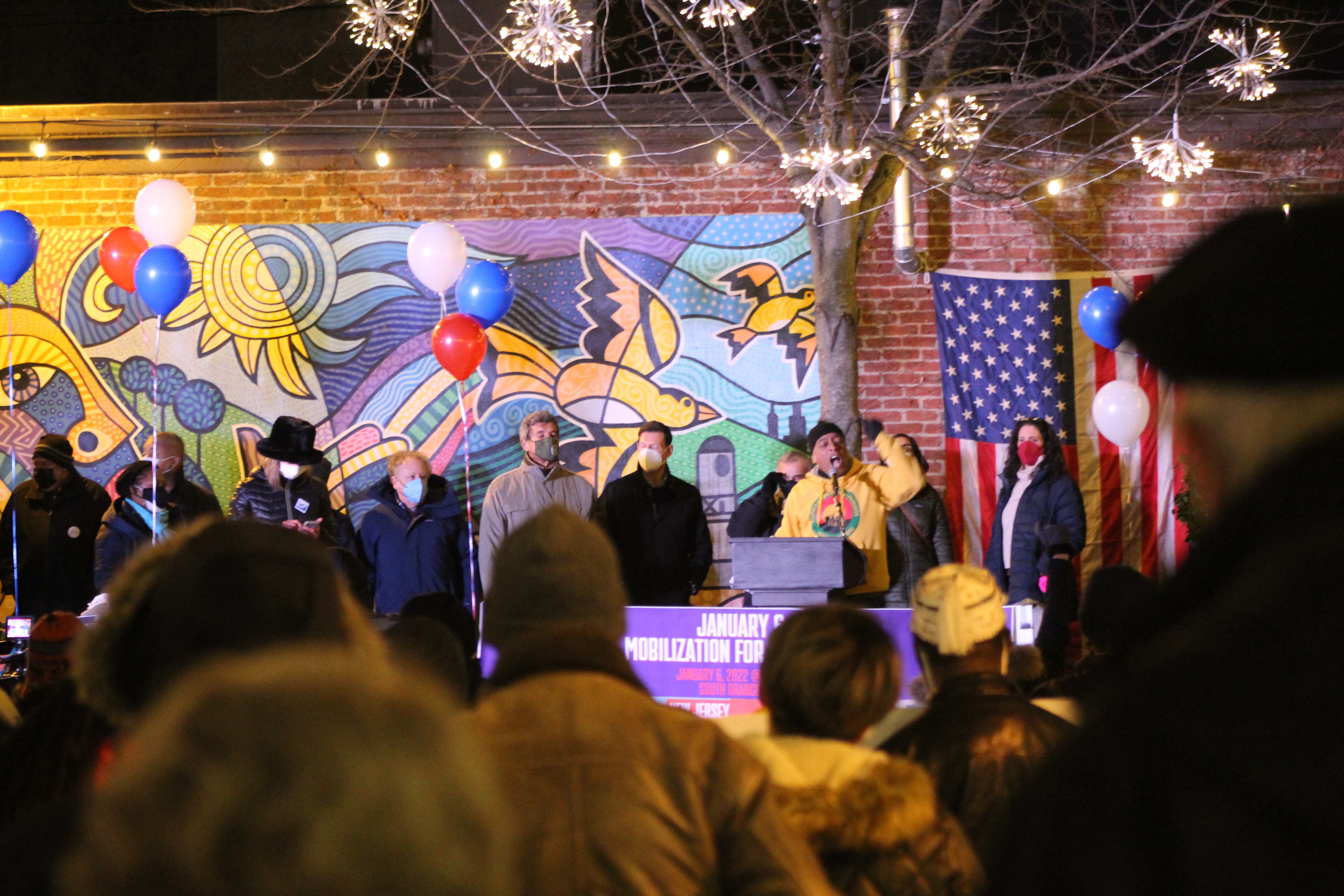
The leader of the People’s Organization for Progress, Larry Hamm, had been patiently waiting to speak. When Hamm was invited to the podium, the activist’s electric energy surged through the ranks of those gathered and made them forget for a while about their numbing feet and fingers, having listened attentively for an hour to a succession of speakers. The crowd did not dwindle during the course of the addresses, despite the cold.
Hamm spoke at great length, beginning by relating that his father and grandfather had fought in both world wars, serving in an army which was racially segregated. “My father fought in the war against fascism… and Fascism is what we’re fighting in the United States today. We can’t be afraid to name the problem and the problem is not a new problem. Fascism didn’t start with the insurrection on January 6. Fascists were marching in this country in the 1930s. They were having rallies at Madison Square Garden. Fascists had summer camps here in New Jersey,” Hamm said, referring to the German-American Bund camp in Andover. This was an overtly Nazi-sympathetic camp which, in 1940, even hosted the Ku Klux Klan for a cross-burning anti-war demonstration in the year before the attack on Pearl Harbor.
Hamm continued, “We’ve got to call it out and not be afraid to confront it. We must stop fascism in the United States of America. That’s what Donald Trump represented, that’s who he had in his cabinet, that’s who he made alliances with… We must organize, brothers and sisters, and we must fight back. We need, as was stated earlier, a massive voter registration. But not just voter registration. We must have massive voter mobilization for every election in this state!”
Hamm, preaching with the fervor of a New Awakening minister, urged an organized effort to participate in elections from the lowest to the highest levels. Hamm said the Proud Boys, a classified hate group according to the Southern Poverty Law Center, attempted to hold a rally in New Jersey and caused a stir in mid-December by protesting at the Woodbridge Township council. Hamm slammed the low voter turnout for school board elections, where he said white supremacists were fielding candidates.
“Every election must become a mass mobilization, [school board] all the way up to the President of the United States, every election, no excuses,” Hamm said. “We must vote like our lives depend on it, because our lives do depend on it.”
Among his demands for change, Hamm called for the abolition of the Electoral College and to reform the Insurrection Act. “Those are the mechanisms that they used to try and overturn this election.”
Hamm said that the endgame of the white supremacist movement was for a constitutional convention, which could be called by 35 of the 50 states. “People don’t understand the gravity of the situation. Let me tell you, these right-wing groups are backed up by right-wing billionaires like the Koch brothers, and their ultimate goal is to have a constitutional convention. They want to change the constitution… Republicans control 32 states, and when they get two thirds of the states, they want to call a constitutional convention to literally rewrite the Constitution in their own image. This is the thing that we’re fighting and a lot of us did not understand this in the election of 2020 and in the election of 2016 people did not understand exactly what was on the line. So I’m so glad a lot of people woke up and 81 million people came out and voted for Joe Biden and we sent Donald Trump back to Florida where he belongs.” Several members of the audience disagreed on that final point, calling out “he belongs in jail!”
Hamm concluded his speech, urging once again the need for an organized effort. “Everybody needs to join an organization. If you’re not a part of an organization, you’re not really serious about the fight.”
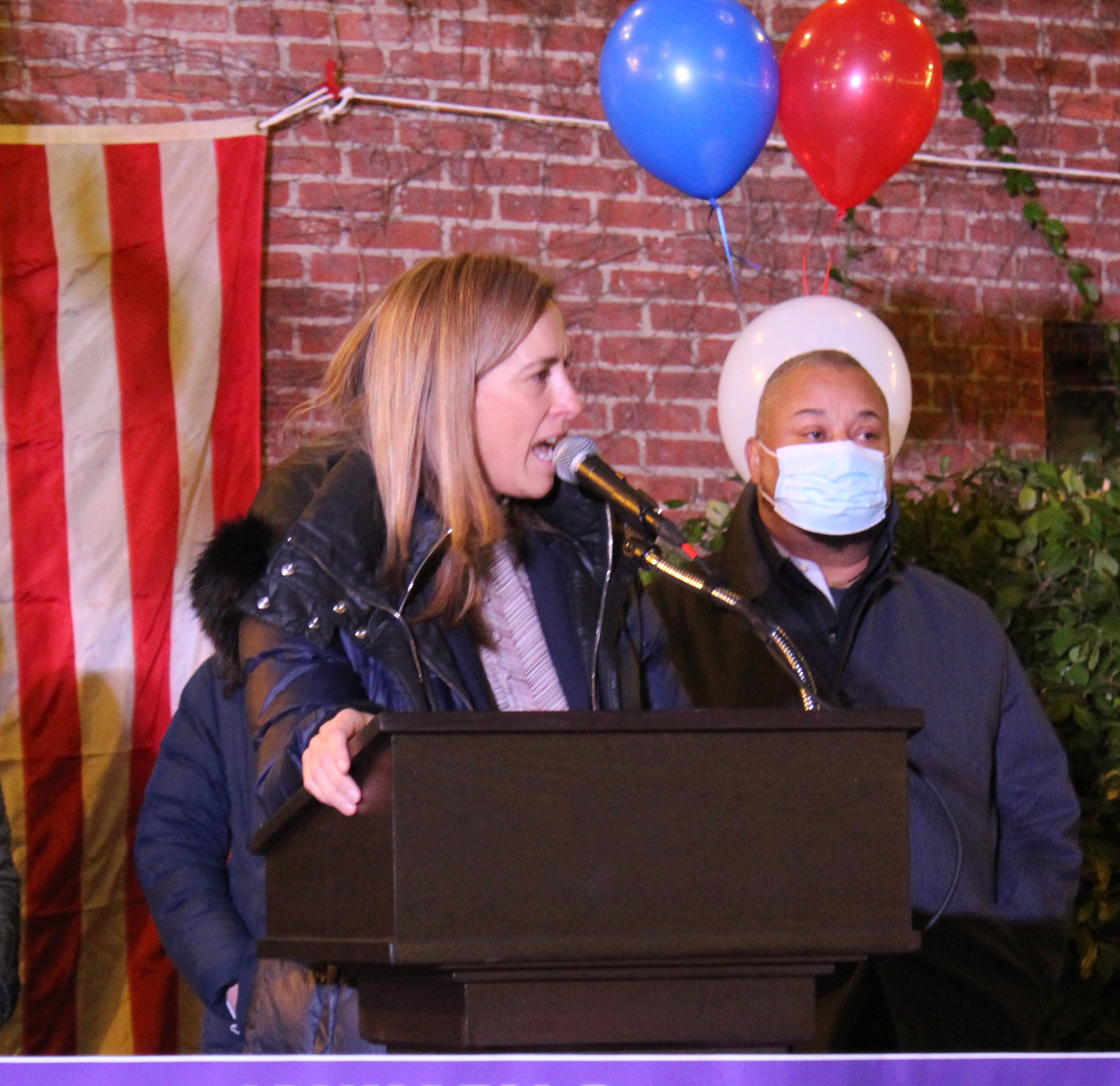
Congresswoman Mikie Sherrill arrived as Hamm was finishing his speech and was the last speaker for the event. Sherrill, a veteran Navy helicopter pilot, recounted her experience during the Capitol attack, hunkered down and clutching a gas mask in one hand and her cell phone in the other. “I remember so clearly, because I had two distinct thoughts in my head a year ago. One was, I can’t believe this is happening. I can’t believe I’m in the chamber of the United States House of Representatives, pinned down by an angry mob of Americans attacking our capitol building and sent by the President of the United States, I can’t believe this is happening to me. Then there was that other side of me, maybe the more cynical side of me, maybe some people might even say, The Jersey Side of me. That side would say, I knew that this was going to happen. I knew it. [Trump] was saying he wasn’t going to turn over power. We were seeing the militias, the Proud Boys, the Boogaloo Boys, we were seeing what was happening in this country. And as I stand here a year from that day, we still have these two separate paths laid out before us. This path of cynicism, this path of division, this path where we lose faith, faith in our democracy, in our country, and our values and our freedom. But then we have the other path. For so many reasons, including all of you who I see here tonight, I know which path this country is taking and which path this country is on. There are too many of us who, for over 200 years, have fought too hard for what we believe in.”
As Sherrill wound down her address, she reminded the audience of how January 6 ultimately ended, to the credit of the nation’s elected leaders. “On the darkest day of our democracy, we were deciding after we had been attacked on the floor of the House, as there was glass everywhere, blood in the chamber—we decided that we would go back and that we would, in fact, certify the election.”
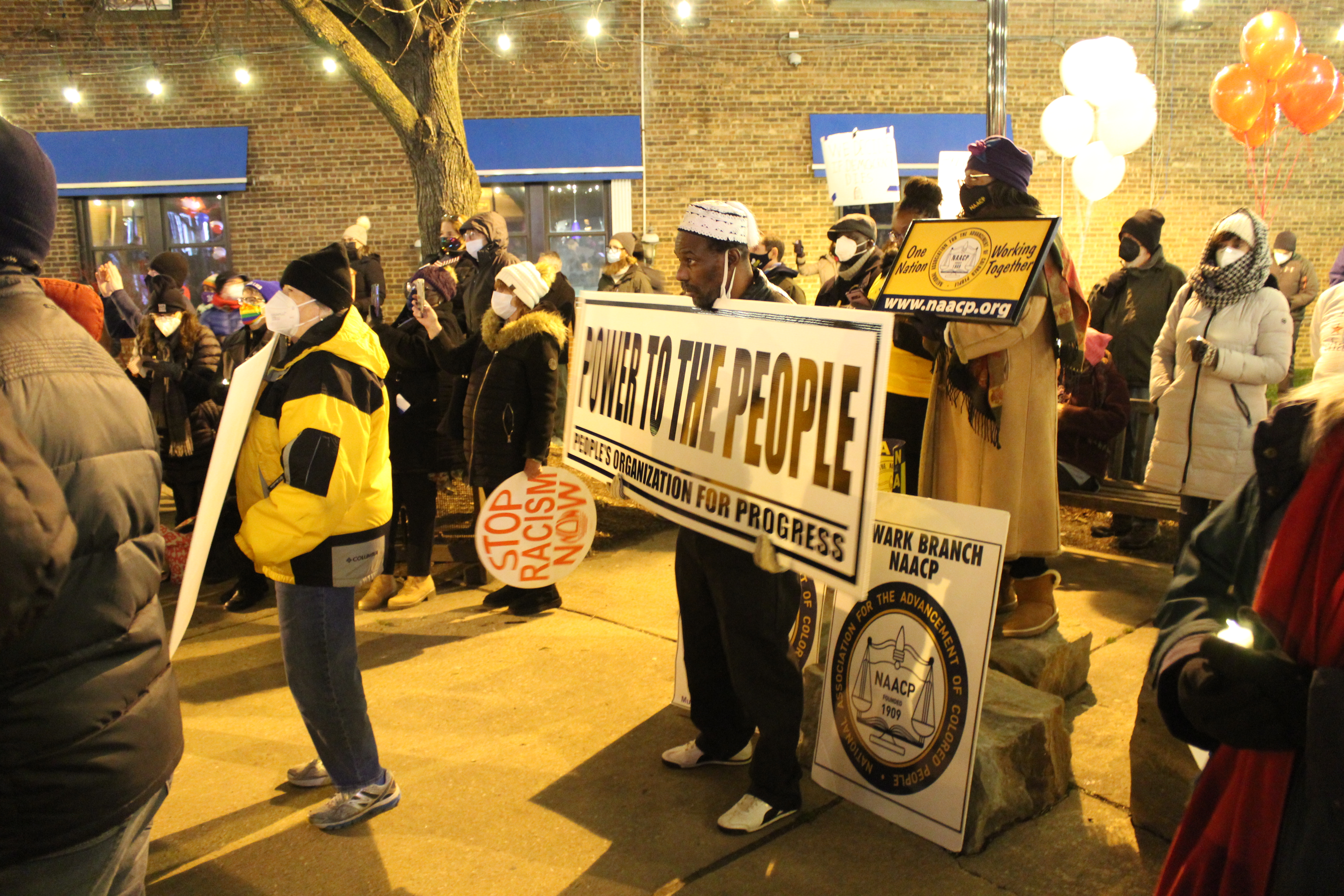








Leave a Reply